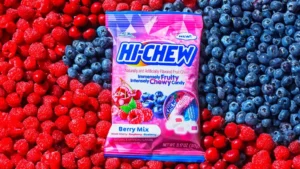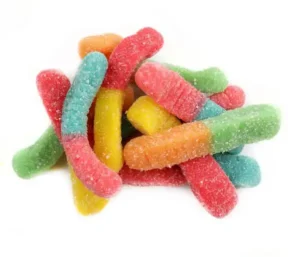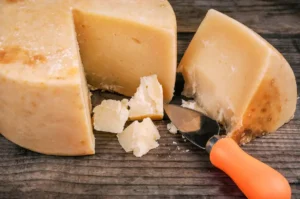Is Hi Chew Halal? A Complete Guide

Are you a fan of Hi-Chew candies but follow a halal diet? If so, you may wonder, “Is Hi Chew halal?” Hi-Chew is a popular chewy candy from Japan that has gained international fame for its soft texture and fruity flavors.
While it’s widely available and loved by people of all ages, it’s important for Muslims to verify whether the product aligns with Islamic dietary laws.
In this article, we’ll explore the ingredients of Hi-Chew, explain why some of its flavors are not halal, and offer guidance for those seeking halal-friendly alternatives.
Understanding what goes into our food is essential, and for Muslims, it is a matter of both health and faith. Let’s take a closer look at whether Hi-Chew fits into a halal lifestyle.
What Is Hi-Chew and Why It’s Popular?
Hi-Chew is a Japanese chewy candy known for its unique blend of soft, taffy-like texture and fruity flavors. Developed by the Morinaga company, it became a hit not just in Japan but globally.
It’s now available in several countries, including the U.S., Canada, and the U.K., offering flavors like strawberry, mango, green apple, and grape. The candy’s combination of softness and long-lasting taste makes it popular among children and adults alike.
While Hi-Chew has a loyal following, questions about its suitability for Muslims arise due to the ingredients it contains. For people who adhere to halal dietary rules, the presence of certain ingredients can render a product impermissible (haram).
Gelatin, in particular, is often a red flag for many Muslims, especially when it is sourced from non-halal animals such as pigs. Unfortunately, most of Hi-Chew’s varieties contain this problematic ingredient, which we’ll explore further.
As demand for halal-friendly foods grows worldwide, people are becoming more conscious of what they consume. It’s now more common for consumers to look beyond the taste of a product and scrutinize its ingredient profile.
In the following sections, we’ll examine the ingredients in Hi-Chew and explain why certain varieties don’t meet halal standards.
Is Hi Chew Halal?
Hi-Chew is not halal because most of its products contain pork gelatin, which is haram in Islam. While some variants like Hi-Chew Bites are gelatin-free, it is essential to remain vigilant and check ingredient labels or look for halal certifications to ensure compliance with Islamic dietary guidelines.
Ingredients of Hi-Chew and Their Halal Status
To understand why Hi-Chew is not halal, it’s essential to look closely at its ingredients. Below is the breakdown of the Strawberry flavor found on the official website:
- Glucose Syrup: A common sweetener derived from corn or wheat. This is generally considered halal unless it comes from non-halal sources.
- Sugar: Standard sugar, often processed from sugarcane or beet. It is usually halal unless processed using non-halal filtering agents.
- Hydrogenated Palm Kernel Oil: Used to improve the candy’s texture and shelf life. This oil is plant-based and therefore halal.
- Pork Gelatin: A key ingredient in many Hi-Chew products. Since it is derived from pigs, it is haram and impermissible for Muslims to consume.
- Malic Acid & Citric Acid: Both are used to enhance flavor and are generally derived from fruits, making them halal.
- Strawberry Concentrated Juice & Flavors: These provide the signature taste of the candy and are halal.
- Emulsifiers (Sucrose Esters of Fatty Acids, Sorbitan Monostearate): These additives are usually plant-based but can sometimes be derived from animal sources. Verification is needed to ensure they are halal.
- Color Anthocyanin: A natural coloring agent derived from fruits or vegetables, considered halal.
The primary issue with Hi-Chew’s ingredients lies in its use of pork gelatin, which makes it unsuitable for those following a halal diet. While some variants, such as Hi-Chew Bites, are gelatin-free, it is still crucial to read ingredient labels carefully to avoid any non-halal elements.
READ ALSO: Are Dots Halal? Complete Ingredient Analysis and Guide
Why Is Hi-Chew Not Halal?
Hi-Chew is not considered halal because the majority of its products contain pork gelatin, an ingredient that is haram in Islam. Gelatin is commonly used in candies to provide elasticity and chewiness, but when derived from pigs, it becomes impermissible for Muslims to consume.
Islam strictly forbids the consumption of pork or any of its derivatives, as clearly stated in the Quran.
Allah says in Surah al-Maa’idah (5:3):
“Forbidden to you (for food) are: Al-Maitah (the dead animals — cattle not slaughtered), blood, the flesh of swine…”
Furthermore, Surah al-An’aam (6:145) reinforces this:
“Say (O Muhammad): ‘I find not in that which has been revealed to me anything forbidden to be eaten by one who wishes to eat it, unless it be Maitah, blood poured forth, or the flesh of swine; for that surely, is impure…'”
Islamic scholars agree that every part of the pig is haram, including gelatin extracted from its bones, skin, or tissues. Even if the gelatin undergoes a chemical transformation, it remains haram because its origin is a pig, which is considered impure.
This means that consuming any product containing pork gelatin, including Hi-Chew, is not permissible.
What About Gelatin-Free Hi-Chew?
Some variants of Hi-Chew, like Hi-Chew Bites, do not contain gelatin, leading to questions about their halal status. While the absence of gelatin is a positive sign, consumers must still be cautious about other ingredients, such as emulsifiers, flavorings, and colorants. If these additives are derived from non-halal sources, even a gelatin-free product may not be fully halal.
The safest approach is to look for candies that carry a halal certification, which guarantees that all ingredients and manufacturing processes comply with Islamic dietary laws.
Halal certifications ensure that not only the ingredients are halal, but that the machinery and production environment are also free from cross-contamination with haram substances.
If you’re unsure about a product’s halal status, contact the manufacturer directly or check with a recognized halal certifying body.
Avoiding doubtful foods aligns with the hadith of the Prophet Muhammad (PBUH), who said: “Leave that which makes you doubt for that which does not make you doubt” (Tirmidhi, 2518).
What Are the Best Halal Alternatives to Hi-Chew?
For those who love chewy candies but want to maintain a halal lifestyle, there are several halal-certified alternatives to explore. Some popular halal options include:
- YumEarth Organic Fruit Chews – These candies are vegan, organic, and halal-certified.
- Candy Kittens – A UK-based brand offering a variety of halal gummies.
- Jelly Belly Gummies – Some variants are halal-certified. Always check the packaging to confirm.
These brands provide the same chewy texture and fruity flavors as Hi-Chew but without any haram ingredients. As more people adopt halal lifestyles, the availability of halal-certified candies is growing, making it easier to find suitable alternatives.
Conclusion
Muslims are encouraged to seek out halal alternatives and avoid doubtful foods to maintain their faith. With the increasing availability of halal-certified candies, you don’t have to compromise on taste or texture. Enjoy your treats while staying true to your beliefs by choosing halal-friendly options.






